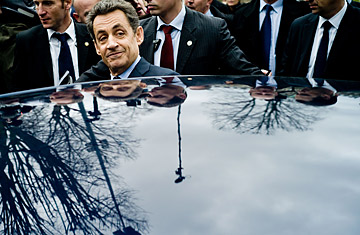
France's President Nicolas Sarkozy gets in to his car after making his New Year wishes speech to civil servants. on January 12, 2012 in Lille, northern France.
(2 of 3)
Little wonder, then, that French voters, dreading the austerity measures that almost certainly await them after the election, might prefer the cuts to be imposed by a President who seems more capable of feeling their pain. Advantage to the unassuming Hollande, son of a social worker, who rides a scooter and eschews Sarkozy's trademark Rolex and posh suits. Yet as French political analyst Nicole Bacharan notes, Sarkozy never hid his admiration and hunger for success and all its trappings or his desire that his own ambition inspire greater effort and reward across the French economy. Unfortunately, that wore thin quickly--and became an affront to voters amid the financial crisis. "Many things the French fault Sarkozy for now are also what made him such an unusual and popular politician in the first place," says Bacharan.
In 2007, Sarkozy's supreme confidence attracted voters who saw in him the promise of a modernized French presidency. His stubborn intransigence on economic liberalization and welfare reform looked refreshing after 12 years of flip-flopping stasis under his predecessor Jacques Chirac. Sarkozy's single-mindedness was also key to his two successful stints as Interior Minister, during which he vowed to purge troubled housing projects of delinquent "scum" and forcefully battled illegal immigration. Too bad if critics called it electoral pandering to the extreme-right National Front party (FN); the resulting popularity fueled Sarkozy's successful presidential run and buoyed his first two reformist years in power.
Now Sarkozy is attempting to replicate that seduction of FN voters. His renewed overtures to the extreme right were on display during a March 11 rally, when he proposed protectionist measures benefiting French and E.U. companies that face what he called unfair competition from the U.S. and Asia. He also pledged to negotiate a tightening of the E.U.'s border treaty. That message echoed Sarkozy's earlier promise to slash immigration to France because "we have too many foreigners."
Besides trying to lure votes for himself, Sarkozy is using his rightward tilt to attempt to prevent the surging FN leader Marine Le Pen from sneaking past him in the first round of voting to qualify for the second spot in the two-person presidential runoff on May 6. It appears to be working. His hard turn right has coincided with polling gains lifting him to a virtual tie with Hollande in the first round of voting at about 28%--with Le Pen stranded at 17%.
Meantime, the police operation in Toulouse that killed Mohammed Merah--the self-described al-Qaeda member responsible for three gun attacks that left seven people dead, including three Jewish children--has restored Sarkozy's status as a fast-acting leader under pressure.
A poll taken after the March 22 assault found that two-thirds of respondents approved of Sarkozy's handling of the crisis. That applause largely drowned out questions about how a man known to French security forces as a radical could have mounted a murderous spree on Sarkozy's watch. But the Toulouse drama has also given credence to Le Pen's claims that she's the only true anti-Muslim candidate among hard-right voters. Meanwhile it has increased countering calls for less division in French society from leftist and centrist backers of Hollande, whom polls still show beating Sarkozy on May 6 by 8 to 10 points.
